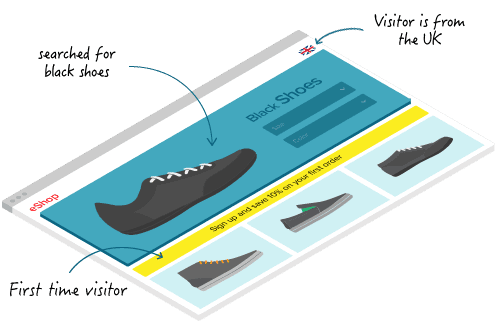It’s no secret that the entire technology sector has evolved massively in the past couple of years. With examples like Machine Learning, Virtual and Augmented Reality approaching a variety of business sectors (even the ones which aren’t normally associated with such technologies), it’s safe to say that business and technology aren’t 2 separate entities anymore. Personalization has been a massive keyword, which fluctuated throughout a vast variety of sectors, from eCommerce to sales and marketing in general. Let’s analyse why and in which ways.

Web Personalization: Overcoming Boring, Overused Marketing Strategies
In the business era where Gen Z is reshaping the face of the internet as we knew it, the need for new digital marketing strategies has become a much-needed prerogative for companies who wanted to obtain results in the short timeframe. Many are aware of practices like SEO, PPC, Paid Social and similar, but few are of personalized, UX-based ones like web personalization. Personalization, in this case, is related to the usage of Python-coded (and therefore, machine learning heavy) tools which are automatically compiling and changing either the appearance of a page, its descriptions and everything in between, based on the users’ preferences. Web personalization operates, generally, with the usage of data points and, therefore, data acquisition-based operators. This is really important to state given the recent Cambridge Analytica scandal.
Personalized Lead Generation
As mentioned in the introduction, lead generation has also been highly targeted by personalization-related strategies: in this case, once again, the usage of data points is connected to a specific person’s preferences on that very subject, a very important factor when it comes to closing down a deal either in person or via phone. Sales as a whole are changing and so is lead generation: in the nearest future, we can expect tailored, data-driven lead generation procedures for each individual product a hypothetical company is trying to sell.
Why Is Data So Important And Why Is It “Personalized”?
In 2018, the most valuable commodity within the entire business world was data. Raw data, big data, data points, data packages and so on were estimated for twice the value oil had during the first semester of last year. In the end, it’s a no brainer: the massive usage of devices, permanently connected to the internet, is the main reason why companies like Apple, Amazon, Facebook and Walmart have been using internal data-driven ads (which have become extremely expensive, by the way). For a company who wants to approach highly scalable, proficuous digital marketing strategies, understanding the power of data in 2019 is mandatory. The personalization process, whether if related to pure digital marketing/retargeting, passive lead generation or pure data analysis, is pretty much a data science matter, especially in 2019 and (most likely) throughout the upcoming years.
To Conclude
Personalizing content on data is a niche procedure which is highly moving towards the mainstream market. Given the analysts’ predictions, we can safely say that data as a whole will still be a massive thing in the next couple of years.
About the author
Paul Matthews is a Manchester-based business and tech writer who writes in order to better inform business owners on how to run a successful business. You can usually find him at the local library or browsing Forbes’ latest pieces. Paul is also the tech lead for the fintech division of the biggest development finance company in Manchester.